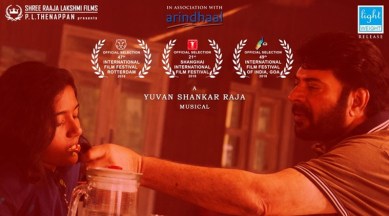Click here to follow Screen Digital on YouTube and stay updated with the latest from the world of cinema.

Director Ram’s latest movie, Peranbu, follows the inner journey of a single middle-aged man with a spastic daughter. In the course of the journey, he learns to accept the nature of various things in the external world without forcing his own opinions on them.
Q: What is love?
A: Attachment.
Q: What is Peranbu (Great Love)?
A: Accepting a person without any reservations about his or her sexual orientation, gender, cast, class so and so forth.
Amudhavan, by his own admission, is just an ‘ordinary’ father, who could not accept the ‘nature’ of his own child. He spent 11 years of his life in Dubai, far away from his daughter in Chennai, slaving as a taxi driver as he was not ready to share the burden with his wife of raising their daughter together.
As they say, karma is a boomerang. His wife writes him a spiteful letter and elopes with another man, leaving the responsibility of Pappa in his weak hands.
Despite his flawed nature, Amudhavan tries to do right by Pappa, who now is not ready to accept him as her father. He is constantly subjected to extraordinary situations that changes his perception about everything under the sun. He eventually learns how not to flinch at something or someone that falls outside of one’s narrow view of right and wrong.
The place Amudhavan picks to settle with his daughter is always foggy, just like his life. He has no clarity on how to play the hand that he’s dealt. But, still, he tries to enjoy the brief warm sunlight that cuts through the mist-enshrouded landscape as and when he can. Even as it lasts for just a few hours or days, like the moments when his daughter finally stops punishing him and begins bonding with him.
His happiness, however, is short-lived. The world around him turns upside down when he finds out that his daughter has hit puberty.
Ram said he developed the story for this film in 2004. But I can’t imagine him making this movie at that point of time owing to the very sensitive nature of its subject. In part, this film is more like the director’s attempt to take a peek through the curtains at what could have transpired between Cheenu and Viji (in Moondram Pirai) that his guru Balu Mahendra’s camera didn’t capture. The question is how a man with noble intentions would have tended to the needs of a woman apart from providing her good food, clean clothes and a roof above her head.
How will that man help the woman who doesn’t understand what’s happening with her body? Or why is it happening? Or don’t know how to deal with it? I am talking about menstruation, which remains a social taboo even in the 21st century.
Unlike Amudhavan, Cheenu never had to cycle to a nearby shop to buy sanitary pads in the middle of the night. Like Pappa, we never got to see Viji struggling to cope with her sexual urges.
Ram forces Amudhavan to choose between the well-being of his daughter and his own fear of what-will-people-say. In the process, the imperfection in his soul is removed through a cleansing process that drives him close to humanity and nature. The film also forces us to accept that it’s very natural for humans to explore their sexuality. Even people who live with spastic cerebral palsy are no exception to this basic human instinct.
Even as the film’s main plot revolves around a father’s internal transformation in the process of supporting the growing needs of his daughter, there is a whole different story in subtext. The film calls out the hypocrisy of society which tries to either repress or exploit one’s sexuality by brute force in name of civilization and culture.
Peranbu is narrated through a series of chapters written and narrated by Amudhavan. Every chapter is titled to highlight the various characteristics of nature: nature is hateful, nature is cruel, nature is wonderous, nature is lawless to name a few. Each character that Amudhavan meets embodies one of these characteristics. And in the end, all of his experiences lead to one harmonious conclusion: nature works in mysterious ways and we should embrace it in all forms without fighting it with our own prejudices.
Click here to follow Screen Digital on YouTube and stay updated with the latest from the world of cinema.